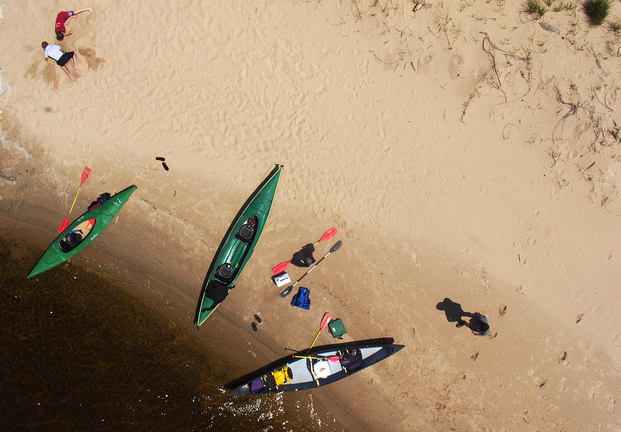Three cheers for a state budget that gets natural resources right

Who thought watching budgets could be exciting? I’ve been watching the roll-out of Gov.Rick Snyder’s new budget with particular interest in what it has to say about natural resources. No doubt there will be special interests who find reasons to criticize the governor’s proposed investments in natural resources, and I expect I will get pushback from both the left and right for this column – however, when a political leader gets it mostly right, I think we need to say so.
As Michiganders, our economy and quality of life are dependent on this state’s beautiful lands and waters. We have the natural assets to recruit and grow businesses based on quality of life we offer their employees and the accompanying ability to attract and retain talent. As we watch parts of the country face long-term drought and water shortages, the rest of the country, and the world, may look to Michigan more and more for sustainable agricultural production, four-season tourism, and access to abundant, high-quality water.
But we will only have those assets to offer if we take care of them. It is high time we had a proposed budget that recognizes the importance of protecting and investing in our natural resources – and outlines a way of doing it that isn’t about pet projects, but rather, anticipating the future and the challenges and opportunities the future will bring.
If my read of it is right, this proposed budget and its investments in natural resources is all about water – water quality, water use, protection and risk mitigation. It is not about trying to turn back the clock to recover long ago budgets, bureaucracy and administrative resources for past programs. It is proposing investments in the science, programs and public/private partnerships needed to understand sustainable use and protection of our resources; to optimize their use while assuring that these resources will still be there, healthy and productive, for future generations.
For business, it means regulating water not to say “no,” but rather to have the science and tools to know when and how to say yes, and assure long-term water quality and watershed health. For farmers, the new Farm Bill and investments like those in this budget are beginning to recognize that we need to incentivize and target practices that reflect how watersheds function and how land management and groundwater use affects the long-term health of the very systems we depend on.
Again, it doesn’t have to be about ‘“no.” Rather, Michigan can emerge as a leader in developing the science, tools and technology of natural-resource use, and be looked to as a model for balancing use with protection. From Detroit, to our state-owned 4.1 million acres of certified sustainable forests, to the increasing demand for groundwater use – let’s show the world how to do it right, how to plan for a sustainable, healthy, beautiful future.
I know everyone has heard the saying “an ounce of prevention is worth a pound of cure” – and it couldn’t be more true than with invasive species. When we face such profound risks as we do to our waters, recreation, business, and Great Lakes from invasive species, increased investment is vital.
So much is at risk from many more species than just Asian carp. Scientists are able to name 10 more species with equally destructive capabilities that are poised to enter the Great Lakes, and those are just the ones we know about – it doesn’t account for the work needed to address accidental introductions and pathways through commercial trade, etc.
Prevention will cost far less than the impact if these species become established in Michigan and the governor’s proposal to invest in this issue couldn’t be more timely. And although Michigan acting alone will not be enough to address invasive species, the governor and his team are trying to lead by example. Once we pass this budget, our next challenge will be to assure that the rest of the Great Lakes states and Canadian provinces are giving this issue equal attention and investment.
It shouldn’t go without mention that there are many other valuable components to the proposed budget, including recycling, a long-overdue fisheries research vessel for Lake Huron, and trails that will enhance this beautiful state.
So what can we do? If you agree with the need for this increased investment in the Governor’s budget for natural resources, you need to let it be known. Take time to look at the details, not to get your pet project in there, rather to see if it speaks to you in the same way about looking forward at a world where water is center stage.
Investing in nature, the source of everything we hold dear and depend on, is not only wise, it is essential. Michigan’s water, beauty and natural resources will increasingly be the envy of the world, so let’s invest and lead in having the science, tools, programs and governance that assure a healthy future.
See what new members are saying about why they donated to Bridge Michigan:
- “In order for this information to be accurate and unbiased it must be underwritten by its readers, not by special interests.” - Larry S.
- “Not many other media sources report on the topics Bridge does.” - Susan B.
- “Your journalism is outstanding and rare these days.” - Mark S.
If you want to ensure the future of nonpartisan, nonprofit Michigan journalism, please become a member today. You, too, will be asked why you donated and maybe we'll feature your quote next time!
 Michigan enjoys great natural resources. Managed well, they can enhance life in the state for every resident. (Photo by Flickr user Juan N Only; used under Creative Commons license)
Michigan enjoys great natural resources. Managed well, they can enhance life in the state for every resident. (Photo by Flickr user Juan N Only; used under Creative Commons license)